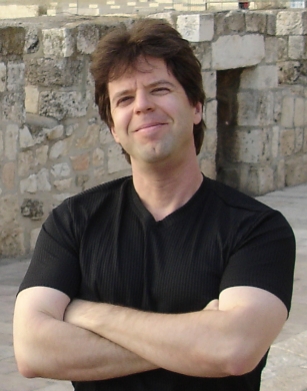 | Dr. Gabriel Robins Professor of Computer Science Department of Computer Science School of Engineering and Applied Science University of Virginia 151 Engineer's Way, P.O. Box 400740 Charlottesville, VA 22904-4740, USA
|
Great supplemental reading in Computer Science
The following is a list of great readings in computer science, with a
focus on algorithms and theory topics:
- The best pair of talks I have ever heard: (and
their associated media
coverage) - Scale of the Universe:
- Other good videos:
- Theory and Algorithms:
- Who
Can Name the Bigger Number, Scott Aaronson, 1999 - The
Limits of Reason, Gregory Chaitin, Scientific American, March 2006, pp. 74-81. -
Breaking Intractability, Joseph Traub and Henryk Wozniakowski,
Scientific American, January 1994, pp. 102-107. -
Confronting Science's Logical Limits, John Casti, Scientific American,
October 1996, pp. 102-105. -
Go Forth and Replicate, Moshe Sipper and James Reggia, Scientific
American, August 2001, pp. 34-43. -
The Science Behind Sudoku, Jean-Paul Delahaye, Scientific American,
June 2006, pp. 80-87. -
The Traveler's Dilemma, Kaushik Basu, Scientific American, June 2007,
pp. 90-95.
- Who
- Biological Computing:
- Computing
with DNA, Leonard Adleman, Scientific American, August 1998,
pp. 54-61. - Bringning
DNA Computing to Life, Ehud Shapiro and Yaakov Benenson, Scientific
American, May 2006, pp. 44-51. -
Engineering Life: Building a FAB for Biology, David Baker et al.,
Scientific American, June 2006, pp. 44-51. -
Big Lab on a Tiny Chip, Charles Choi, Scientific American, October 2007,
pp. 100-103. - DNA
Computers for Work and Play, Macdonald et al, Scientific American,
November 2007, pp. 84-91.
- Computing
- Quantum Computing:
-
Quantum Mechanical Computers, Seth Lloyd, Scientific American,
1997, pp. 98-104. -
Quantum Computing with Molecules, Gershenfeld and Chuang, Scientific
American, June 1998, pp. 66-71. - Black
Hole Computers, Seth Lloyd and Jack Ng, Scientific American, November
2004, pp. 52-61. - Computing
with Quantum Knots, Graham Collins, Scientific American, April 2006,
pp. 56-63. - The
Limits of Quantum Computers, Scott Aaronson, Scientific American,
March 2008, pp. 62-69. -
Quantum Computing with Ions, Monroe and Wineland, Scientific American,
August 2008, pp. 64-71.
-
- History of Computing:
-
Alan Turing's Forgotten Ideas, B. Jack Copeland and Diane Proudfoot,
Scientific American, May 1999, pp. 98-103. -
Ada and the First Computer, Eugene Kim and Betty Toole, Scientific
American, April 1999, pp. 76-81. -
Decoding an Ancient Computer, Tony Freeth, Scientific American,
December 2009, pp. 76-83. -
The Origins of Computing, Martin Campbell-Kelly, Scientific American,
September 2009, pp. 62-69.
-
- Security and Privacy:
-
Malware Goes Mobile, Mikko Hypponen, Scientific American, November
2006, pp. 70-77. -
RFID Poweder, Tim Hornyak, Scientific American, February
2008, pp. 68-71. - Can
Phishing be Foiled, Lorrie Cranor, Scientific American, December 2008,
pp. 104-110.
-
- The Web:
-
The Semantic Web in Action, Lee Feigenbaum et al., Scientific
American, December 2007, pp. 90-97. - Web
Science Emerges, Nigel Shadbolt and Tim Berners-Lee, Scientific
American, October 2008, pp. 76-81.
-
- Future of Computing:
-
Microprocessors in 2020, David Patteson, Scientific American,
September 1995, pp. 62-67. -
Computing Without Clocks, Ivan Sutherland and Jo Ebergen, Scientific
American, August 2002, pp. 62-69. -
Making Silicon Lase, Bahram Jalali, Scientific American, February
2007, pp. 58-65. -
A Robot in Every Home, Bill Gates, Scientific American, January
2007, pp. 58-65. -
Ballbots, Ralph Hollis, Scientific American, October 2006,
pp. 72-77. -
Dependable Software by Design, Daniel Jackson, Scientific American,
June 2006, pp. 68-75. -
Not Tonight Dear - I Have to Reboot, Charles Choi, Scientific
American, March 2008, pp. 94-97. -
Self-Powered Nanotech, Zhong Lin Wang, Scientific American, January
2008, pp. 82-87. -
Powering Nanobots, Thomas Mallouk and Ayusman Sen, Scientific
American, May 2009, pp. 72-77. -
Racetrack Memory, Stuart Parkin, Scientific American, June 2009,
pp. 76-81 -
The Next 20Years of Microchips, Scientific American, June 2009, pp. 82-89
-
- Historic / seminal papers:
- The
Wikipedia Math Portal:- Problem solving
- List of Mathematical lists
- Sets and
Infinity - Discrete mathematics
- Proof techniques and
list of proofs - Information theory,
entropy, and
randomness - Game theory
- Problem solving
- The Wikipedia Computer Science
Portal:- Theory of computation
and Automata theory - Formal languages
and grammars - Chomsky hierarchy
and the Complexity Zoo - Regular,
context-free,
Turing-decidable
and
Turing-recognizable
languages - Finite automata,
pushdown automata, and
Turing machines - Computational complexity
- Algorithm
- List of data
structures
and
algorithms - The Turing Test
- The Technological Singularity
- Theory of computation
- Mathematica's Math World
- Additional great books:
- Computational Geometry - An Introduction, Preparata and Shamos
Infinity and the Mind: the Science and Philosophy of the Infinite, R. Rucker- How
to Solve It, G. Polya - Godel,
Escher, Bach: An Eternal Golden Braid, D. Hofstadter
- Computational Geometry - An Introduction, Preparata and Shamos
- General great advice on life, research, and graduate school:
- Randy
Pausch's 'Last Lecture', its Oprah Show
Reprise, and its related media
coverage) - Randy
Pausch's 'Time Management' lecture and its Powerpoint
slides.
You
and Your Research (or PDF)- Graduate
School Advice
- Randy
Return to Gabriel
Robins' home page
 EMail
EMailto robins@cs.virginia.edu
Comments"

No comments:
Post a Comment